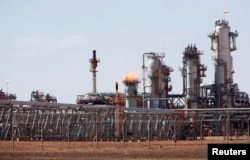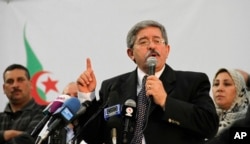A rare public appearance by veteran Algerian President Abdelaziz Bouteflika is fueling speculation he will run for a fifth term next year, a move that would mean at least short-term stability for a key U.S. ally and one of Europe's main gas suppliers.
Bouteflika has largely disappeared from public view since a stroke in 2013, so his appearance on Monday to open a restored mosque and two metro stations is seen as a sign the country's ruling elite want him to stay on to avoid an unclear succession.
In power since 1999, the visibly frail, wheelchair-bound 81-year-old saluted a crowd outside the Ketchaoua Mosque in Algiers waving national flags and holding placards with photos of the president.
Bouteflika's appearance also came two days after the ruling National Liberation Front (FLN) called on him to run again and as state media sought to dispel doubts about his health by showcasing his past meetings with foreign dignitaries.
While another term for Bouteflika would give a ruling caste of FLN officials, generals and business tycoons time to organize a smooth succession, it is likely to be a source of frustration for young Algerians worried about unemployment and austerity in a state-controlled economy suffering from low oil prices.
"I do not care about politics and politicians. Bouteflika running for a fifth term, a sixth term, or not? Not my problem," said Amin Ferrah, 22, a student who works in a pizzeria. "Politics is not my world."
In a country where about half the population is under 25, many young Algerians are looking abroad. Ferrah wants to go to Canada, while others have taken the perilous sea crossing to Europe.
The government has said it wants to diversify the economy away from oil and gas, which accounts for 60 percent of budget finances, but there has been resistance from those within the ruling elite to opening up to foreign investment.
The key decision makers in Algeria are veterans who fought from 1954 to 1962 against French occupation and fiercely oppose what they call foreign interference. That has left the economy dominated by the state and firms run by business tycoons.
'Delicate situation'
Opponents say Algeria needs a national dialogue to overcome what they call "the gravity of the situation," a veiled call on the country's power brokers to assess Bouteflika's health.
"Our country has never been in such a delicate situation, carrying such a great risk of breaking civil peace, stability and national security as it is now," Ali Benflis, a leading opposition figure who ran against Bouteflika in 2004 and 2014, told reporters a month ago.
Benflis was referring to strikes by teachers and doctors that have been running for months. The government has been unable to offer them more cash as it has done in the past, because the fall in oil prices has stretched public finances.
Energy revenues have halved since 2014, and the government has launched austerity measures, banning the import of 900 goods and freezing public sector hiring and development projects.
Bouteflika has not said he wants to run again, but previous presidential campaigns have followed similar statements from the FLN that called on him to continue. Bouteflika's supporters say his mind remains sharp, even though he needs a microphone to speak.
"The president enjoys all his mental and intellectual abilities," Lakhdar Brahimi, a retired U.N diplomat and close friend, said in a recent interview with local media. "His memory is very strong. And it's him sometimes who
reminds me of dates and people. Except for his dead voice, he is in good shape and he rules the country."
Bouteflika is part of a thinning elite of the veterans who fought France in the independence war and have run Algeria ever since. Many also credit him with ending a civil war with Islamists in the 1990s that killed 200,000 people.
He is unlikely to face competition from within ruling circles. Prime Minister Ahmed Ouyahia, leader of the National Rally for Democracy (RND) allied to the FLN, has already said he will not run if Bouteflika goes for a fifth term.
Analysts say the opposition, fractured between moderate Islamists and left-wing groups, is also unlikely to mount a serious challenge in presidential elections expected in the first half of 2019. No date has been set.
In addition, thousands of former Islamist fighters who accepted a partial amnesty to end the civil war could be potential Bouteflika supporters if he runs again. While the fighters did not get any political rights under the original
deal, Bouteflika is now expected to offer them full rights.
No one has yet said he will run against Bouteflika, even though the president has said he wants more competition. He won with 82 percent of the vote in 2014, 90 percent in 2009, 85 percent in 2004 and 74 percent in 1999.
"The political scene must experience diversity, a confrontation of programs, and a race to power," Bouteflika said last month in a letter read out by an adviser.







